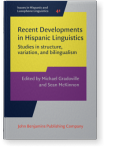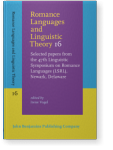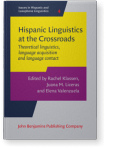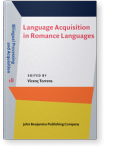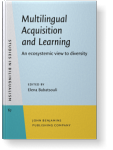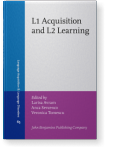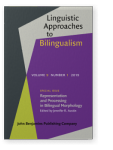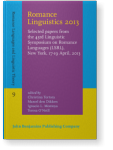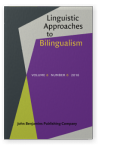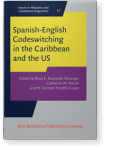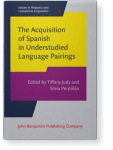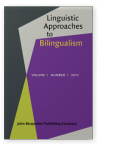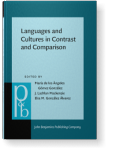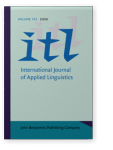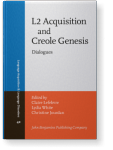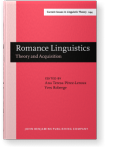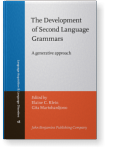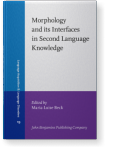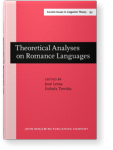Juana M. Liceras
List of John Benjamins publications for which Juana M. Liceras plays a role.
Book series
Title
Hispanic Linguistics at the Crossroads: Theoretical linguistics, language acquisition and language contact. Proceedings of the Hispanic Linguistics Symposium 2013
Edited by Rachel Klassen, Juana M. Liceras and Elena Valenzuela
[Issues in Hispanic and Lusophone Linguistics, 4] 2015. xviii, 339 pp.
Subjects Romance linguistics | Theoretical linguistics
2024 Chapter 11. The narrative abilities of Spanish monolinguals and Spanish–Catalan bilinguals with Prader–Willi syndrome Language Acquisition in Romance Languages, Torrens, Vicenç (ed.), pp. 253–282 | Chapter
This study investigates the narrative abilities of seven Spanish monolinguals and six Spanish – Catalan bilinguals with Prader–Willi syndrome. All participants were asked to narrate A boy, a dog, and a frog (Mayer, 1967) in Spanish. Additionally, bilinguals were also asked to narrate Frog, where… read more
2024 Chapter 21. Prosody and head directionality: On the predictability of the prosody of conjunctive coordination Multilingual Acquisition and Learning: An ecosystemic view to diversity, Babatsouli, Elena (ed.), pp. 556–584 | Chapter
The relationship between prosodic encliticization of the conjunctive coordinator and OV word order (or the equivalent correlation between VO and procliticization) is a strong descriptive universal. Namely, if a language shows prosodic encliticization (prosodic attachment after the initial… read more
2021 Chapter 8. On the nature of crosslinguistic influence: Root infinitives revisited L1 Acquisition and L2 Learning: The view from Romance, Avram, Larisa, Anca Sevcenco and Veronica Tomescu (eds.), pp. 203–228 | Chapter
Root Infinitives (RI) in Spanish have an infinitival marker, while in English they are bare forms. For languages like English, the RI stage has been said to be longer and to have a higher incidence than in Spanish. Within Liceras, Bel, and Perales’ (2006) typology of an RI universal stage,… read more
2019 Compounding and derivation: On the ‘promiscuity’ of derivational affixes Representation and Processing in Bilingual Morphology, Austin, Jennifer R. (ed.), pp. 42–72 | Article
Inflectional affixes only adhere to the head of Noun-Noun (NN) compounds which implies that the plural of casa cuna (‘crib house’) or hombre lobo (‘werewolf’) is casa-s cuna (‘crib houses’) and hombre-s lobo (‘werewolves’) respectively, while *casa cuna-s and *hombre lobo-s ‒ with the plural… read more
2016 Beyond the subject DP versus the subject pronoun divide in agreement switches Romance Linguistics 2013: Selected papers from the 43rd Linguistic Symposium on Romance Languages (LSRL), New York, 17-19 April, 2013, Tortora, Christina, Marcel den Dikken, Ignacio L. Montoya and Teresa O'Neill (eds.), pp. 79–98 | Article
Previous code-switching literature argues that no switch takes place between a pronoun and a verb, while Determiner Phrases (DPs) do code-switch. This paper uses code-switching acceptability judgment data elicited from three groups of English–Spanish bilinguals (2L1 children, L2 English children… read more
2016 Linguistic theory and the Synthesis Model: Beyond feature matching restrictions Epistemological issue with keynote article “The development of bimodal bilingualism: Implications for linguistic theory” by Diane Lillo-Martin, Ronice Müller de Quadros and Deborah Chen Pichler, pp. 776–781 | Commentary
2016 Language dominance and language nativeness: The view from English-Spanish codeswitching Spanish-English Codeswitching in the Caribbean and the US, Guzzardo Tamargo, Rosa E., Catherine M. Mazak and M. Carmen Parafita Couto (eds.), pp. 107–138 | Article
Investigating the interpretation and production of codeswitched structures involving functional and lexical categories by bilingual speakers constitutes a reliable tool to assess language dominance and/or nativeness. Language dominance has been described and measured in the context of bilingualism… read more
2015 Typological proximity in L2 acquisition: The Spanish non-native grammar of French speakers The Acquisition of Spanish in Understudied Language Pairings, Judy, Tiffany and Silvia Perpiñán (eds.), pp. 329–358 | Article
Typologically-close languages such as French and Spanish share many typological universals and macroparametric options but display different microparametric options as well as obvious and subtle morphological, syntactic and processing differences. This counterposed situation that we conceptualize… read more
2008 Linguistic theory and bilingual systems: Simultaneous and sequential English/Spanish bilingualism Languages and Cultures in Contrast and Comparison, Gómez González, María de los Ángeles, J. Lachlan Mackenzie and Elsa M. González Álvarez (eds.), pp. 275–297 | Article
Using data from simultaneous and sequential bilingualism, we address a series of learnability issues by investigating the acquisition of four different structures: (i) the [Gender] feature of the Spanish Determiner in the production of English/ Spanish mixed Determiner Phrases; (ii) the… read more
2006 Agreement in the English Interlanguage of Basque/Spanish Bilinguals: a Minimalist Farewell to pro ITL - International Journal of Applied Linguistics 151, pp. 83–98 | Article
This study investigates the status of subject pronouns in the English interlanguage of Basque-Spanish bilinguals from a minimalist perspective. The oral production of 20 participants was analyzed at two different points in their acquisition of English (Time 1:396 hours of exposure; Time 2:564 hours… read more
2006 L2 Acquisition as a process of Creolization: Insights form child and adult code-mixing L2 Acquisition and Creole Genesis: Dialogues, Lefebvre, Claire, Lydia White and Christine Jourdan (eds.), pp. 113–144 | Article
2003 Spanish L1/L2 Crossroads: Can We Get ‘There’ from ‘Here’? Romance Linguistics: Theory and Acquisition, Pérez-Leroux, Ana Teresa and Yves Roberge (eds.), pp. 317–350 | Article
1999 Null subjects in non-native grammars: The Spanish L2 of Chinese, English, French, German, Japanese and Korean speakers The Development of Second Language Grammars: A generative approach, Klein, Elaine C. and Gita Martohardjono (eds.), pp. 109–146 | Article
1998 On the Nature of the Relationship between Morphology and Syntax: Inflectional Typology, f-Features and Null/Overt Pronouns in Spanish Interlanguage Morphology and its Interfaces in Second Language Knowledge, Beck, Maria-Luise (ed.), pp. 307–338 | Article
1998 Licensing and identification of null categories in Spanish non-native grammars Theoretical Analyses on Romance Languages: Selected papers from the 26th Linguistic Symposium on Romance Languages (LSRL XXVI), Mexico City, 28–30 March, 1996, Lema, José and Esthela Treviño (eds.), pp. 263–282 | Article
